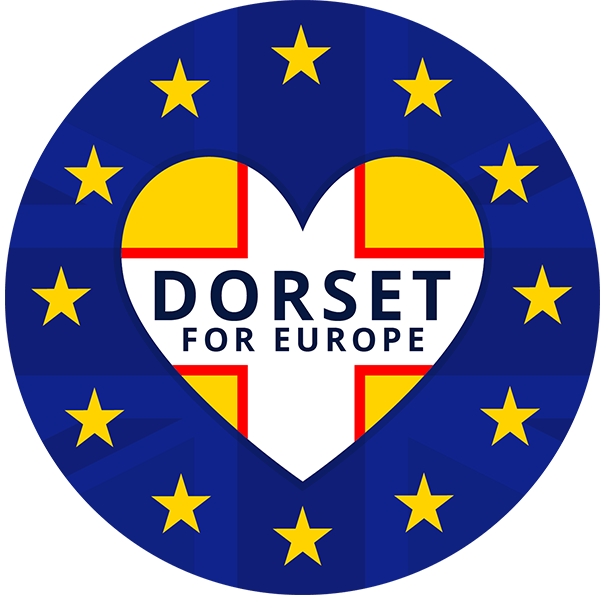Useful Info
Busting Brexit Myths
Brexit has now happened, but the inaccuracies and falsehoods about the EU that were peddled by the Leave campaign in 2016 have left a damaging legacy.
Despite being thoroughly debunked, many of the lies remain lodged in many people’s minds. Bendy bananas? £350 million a week? EU army? Turkey accession?
This page aims to arm campaigners with accurate rebuttals.
Brexit is the Will of The People
Most Leave voters don’t like the idea of a 2nd referendum or “People’s Vote”, they say it’s an affront to democracy to even campaign for one. Every clear thinking person can see the immediate problem with this one. How, surely, can having more democracy be undemocratic?
It is the very essence of democracy for the people to be able to campaign and argue for whatever they want. Democracy is a continuous process and doesn’t end with any one vote. As Nigel Farage said before the referendum, a 48:52 victory in favour of Remain would be ‘unfinished business’. It’s a bit rich that people like him claim we are undermining democracy. In fact, it’s the Leave campaigns that won the 2016 referendum undemocratically.
For a democracy to function, the people must be sufficiently well informed and enabled to make an educated decision. The campaigning and voting process must be free and fair, and subject to a level playing field of rules and regulations governing spending and honesty, among other things. It is now known to a criminal standard of proof that both Vote Leave and Leave.EU broke electoral law, overspending by up to 10%. Both campaigns also broke data protection legislation. Both campaigns have been fined and referred to various police forces for their crimes. Arron Banks is being prosecuted because he can’t explain where his £8m of funding came from. Boris Johnson is being prosecuted for the £350m bus claim. For more on the lies, lawbreaking and hypocrisy of the Leave campaigns visit brexposed.uk.
Opinion polls since the 2016 referendum, especially in the last year or so, show increasingly that remain has overtaken Leave, currently (March 2019) by a 10 point lead – that says a lot about where real will of the people is going.
We survived before, we’ll survive again
Who wants to simply survive when we can thrive?
The EU was conceived as a peace project in the 1940s following the 2nd world war and has provided stability and growth for its members ever since. Today’s connected world means that countries will collaborate more, and be more connected than ever – this helps in numerous ways, trade being one of them of course, but also it is the only way we’ll combat terrorism, climate change, international crime, etc. Playing a strong part in the EU has been hugely beneficial to the UK, not only financially. We have led the world on climate change and have played a key part in global politics.
‘Survival’ is inward looking – we must work together so that everyone thrives.
The EU is the largest and most successful trading block in the world with over 500m people in 28 countries and and economy worth $17 trillion. 45% of our exports, and 55% of our imports are with the EU 27 alone, with a similar amount traded through countries have trade deals with via the EU . We have trade deals with 67 countries, with negotiations ongoing with a further 22. Our economies are so entwined that leaving is very complicated and time consuming. Sure, we could ‘survive’ without it. But who wants to merely survive? The majority of the country want to be more prosperous and have better access to good quality public services. The EU is the best way of maintaining the income required to provide good public services, while our collaboration on medicines, climate change, crime, etc. means it’s greater efficiencies in many everyday government functions. Leaving the EU means greater UK bureaucracy, higher costs, lower standards.
It’s important to note that for the average person, membership of the EU costs less than a TV licence. See the chart below:
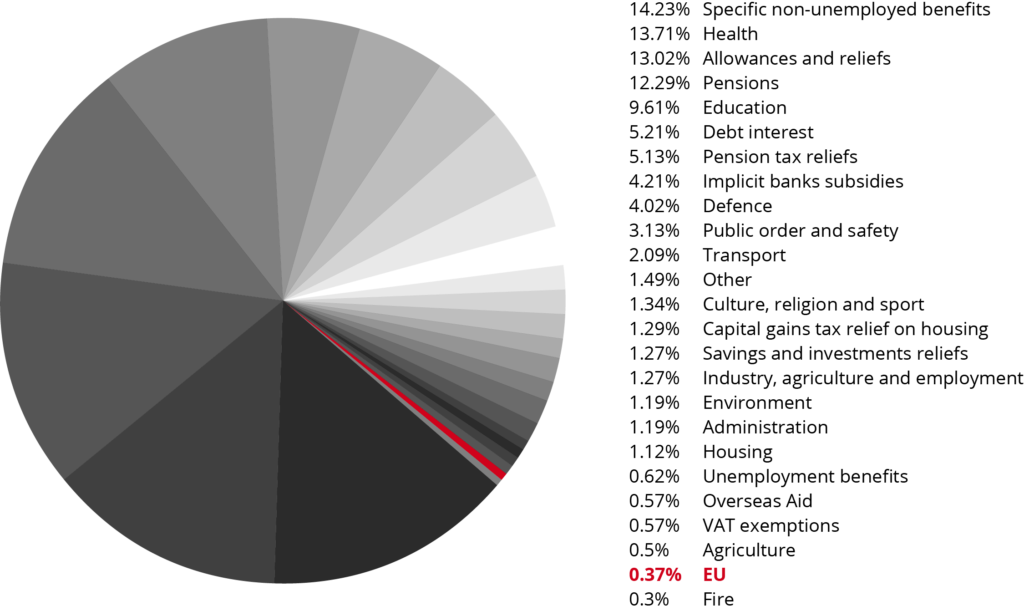
WTO is easy – just walk away!
If only it were that simple. The EU’s relationship with the UK runs much deeper than simply trade. WTO rules cover trade only. The ‘Four Freedoms’ of free trade in goods, free trade in services, free movement of money and of people means there are thousands of laws and regulations that we have willingly signed up to that will need to be carefully unpicked to ensure the smooth running of our economy and to ensure that key services can be maintained. For example the laws, regulations and compliance requirements on aviation, international taxation, food standards, medicines, nuclear materials, workers rights, international payments, insurance, and many many more would end over night should we leave the EU with no deal or transition agreement.
Not only this, the UK’s treaties with the EU and 3rd countries through the EU would be broken. That means breaking international law and we could find ourselves in the international courts.
Some people believe we would not have to pay the EU ‘divorce payment’, however this is not the case. We signed up to certain obligations. There are many ongoing EU projects that we contribute to through our EU membership, we have UK citizens who need to collect pensions, etc. These need to be paid for and are due whether we leave the EU with or without a deal.
Leaving the EU without a deal on ‘WTO rules’ would mean we are the only country in the world that operates on WTO terms alone. It is worth remembering that WTO is the fall-back position, the ‘backstop’ that means we can all trade together. It is the worst trading position possible, which is why countries make bilateral trade deals, or form trading blocks like the EU.
On WTO terms we are at the mercy of 164 countries that must all agree to our tariff and quota schedules. As we know, negotiating with 27 countries is hard enough when we’re not in a strong position. we would be at the mercy of any country with a grudge. And we’ve already had 20 countries line up against our schedules – including America (one of the Brexiters first choices for a trade deal.)
In reality, on a WTO exit we would be in the worst possible situation. We would be desperate for ANY deal we could get, so would have to give up many of the quality standards we currently take for granted. Trade deals often come with other hidden costs. For example, the USA has insisted that we take their sub standard meat and GM crops, and demands access to our health care system, effectively opening up the NHS to big money interests in the US (the NHS is the largest single drugs market in the world.) India has insisted they get preferential visa-free travel and working rights in the UK. The US has insisted that if we do a deal with them we can’t then do any deals with China.
Contrast this mayhem with our current situation. Through the EU we have full free trade in goods and services with 27 countries. We have further free trade agreements with 40 other countries. The EU is currently in active negotiation with a further 22 countries. Of the top 30 countries in the world for GDP the EU has trade agreements, or is in active negotiation with, with 27 of them.
Leaving on WTO terms would be a massive mistake, there was no mandate for it via the 2016 referendum (it wasn’t even considered an option).
See the charts below: The Red colours show countries either in the EU27 or with agreed and active trade deals, orange colours show trade deals currently in active negotiation. Blue colours show countries where we have either suspended trade deals (notably the USA), or have no trade deals in place (Iran).
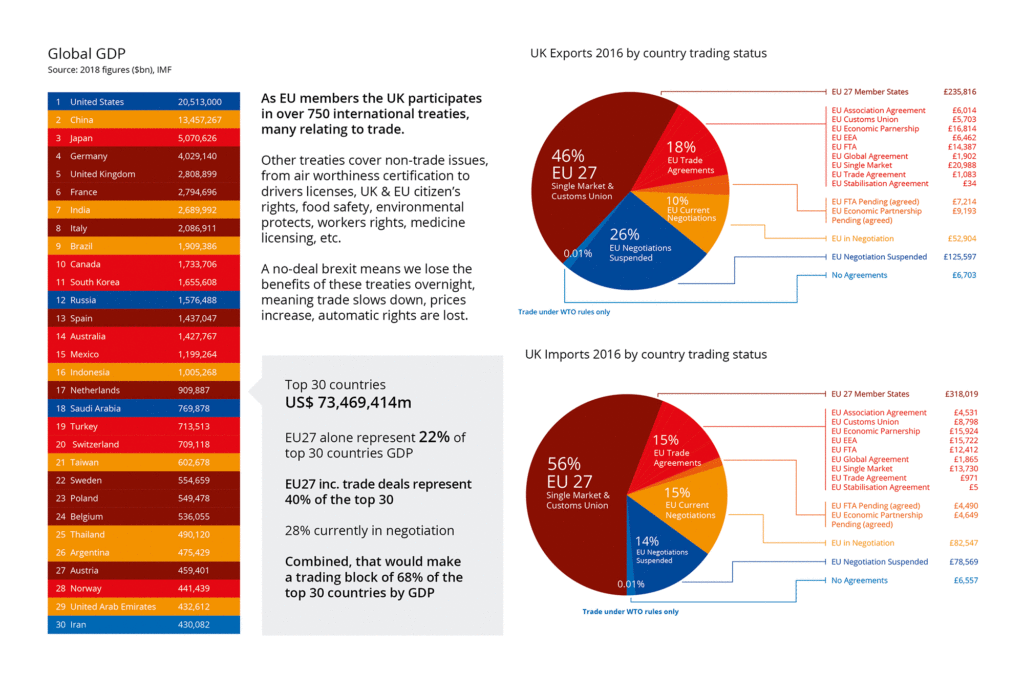
Article 24 / WTO Brexit
Pro-Brexit campaigners say even if Britain and the EU fail to agree terms for their divorce, Article 24 of the World Trade Organization’s (WTO) General Agreement on Tariffs and Trade would let them keep trading as now for up to a decade. This is another Leaver Lie. For Article 24 to come into force it would require an agreement on both sides and an agreed time frame to allow this. Because Brexiters insist that leaving on WTO terms means ‘no-deal’ and no ‘divorce payment’ there is no way that there would be sufficient good will for Article 24 to come into play.
Although there is a clause in the rules that allows for interim agreements, WTO spokesman Keith Rockwell said it also requires the two sides to provide a plan and reasonable time-frame for their deal to take shape: a distant prospect.
“This presupposes, of course, that both the UK and the EU agree on the process of negotiating a deal, whatever form that deal may take. It would also require that both parties agree to an interim deal,” he said.
Trade lawyers are exasperated that Article 24 keeps resurfacing, despite their attempts to knock it down.
“It’s amazing how this awful misinterpretation of Art XXIV GATT won’t die, no matter how many times I point this out,” Lorand Bartels, reader in international law at the University of Cambridge, tweeted in May last year.
“It’s utter nonsense,” former Australian trade negotiator Dmitry Grozoubinsky tweeted in December.
“It relies on your being too busy to read Article XXIV of the GATT, or too confused by trade legalese to parse it.”
Source: House of commons library | Reuters
The EU is a German plot
It’s unbelievable that this comes up in our conversations on the street stalls. What is it about the British that we can’t let go of the war? A bit of ‘Fawlty Towers’ humour can be enjoyed in the context of post-war British comedy, but 40 years on from Basil Fawlty, and 74 years on from WW2, this view is embarrassingly out of touch and smacks of the very racism and xenophobia we fought against in the war.
The EU was conceived as a peace project and chief among its advocates was Winston Churchill. In his view, closer integration of Europe as the only way to keeping its feuding countries from killing each other. Since then the EU has grown to become the largest and most successful trading bloc in the world. Europe has moved on, what is it about some Brits that they can’t?…
We’re fed up with all the rules
There is a type of of Brexiter who is motivated not by xenophobia, or empire nostalgia, or buccaneering trade fantasies, but instead by “all them EU rules”. Sadly they can rarely name a single one, the reason being there are hardly any! The commons library looked at how many UK laws were influenced by EU laws and found 4,514 out of 34,105. And of those 4,514 only 72 were laws we didn’t vote for.
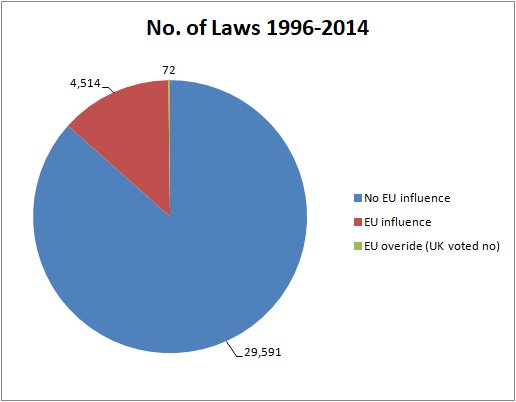
The crazy thing is that it is very hard to find any rules that most people disagree with. Here are some examples (for the complete list read this Twitter thread):
- Food labels should say if Aspartame is present.
- Ban on livestock growth-boosters with hormonal, thyrostatic or beta-agonist effects (carcinogenic residue in meat).
- Safety advisers dealing with transport of dangerous goods on public roads etc must be properly trained and regulated.
- Conservation measures to preserve North Atlantic fish stocks.
- Additives to mineral water must be safe and labels must be honest (eg “spring water” has to come from an actual spring)
- Posted workers must be given the same pay and conditions as local workers.
- A consistent approach to data collection on goods traded between member states?
- Tightening up on livestock health checks, paperwork and traceability.
It’s very easy however to find the source of this particular myth. Just take a look through any one of our right-leaning tabloids. The London School of Economics took the EU’s now famous list of EU Myths (link here) and created a chart showing the biggest offenders. Not many surprises here as to who’s the worst. See below chart:
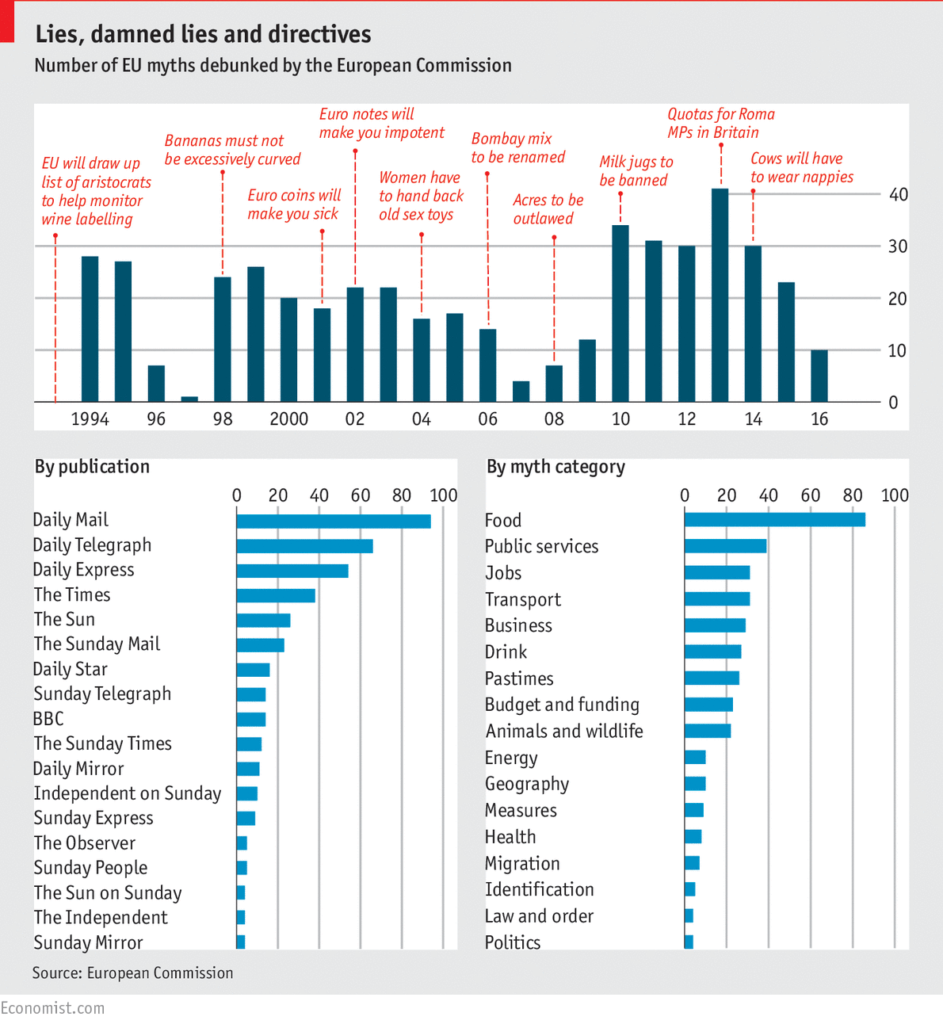
The Lisbon Treaty says…
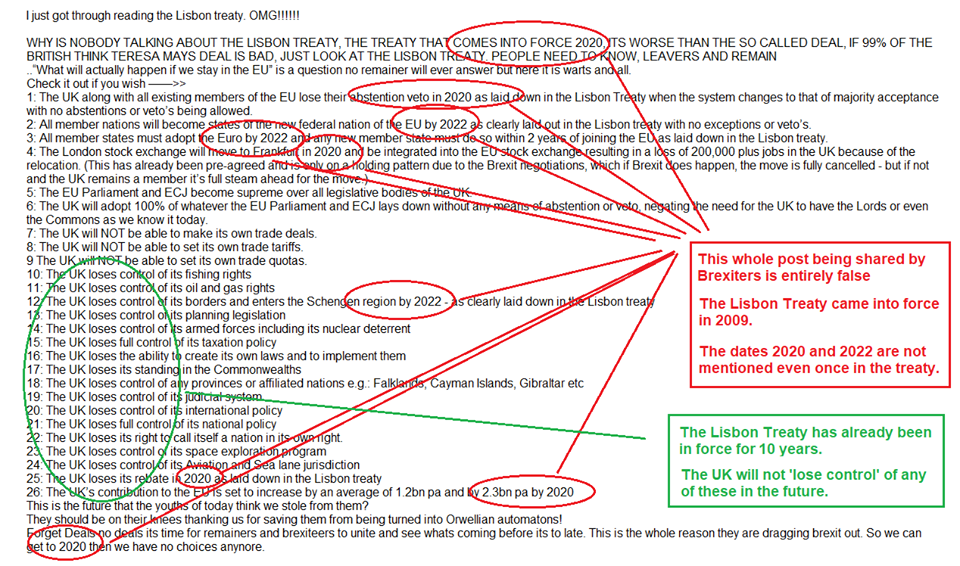
Since late 2018 there’s been a cut and paste list of spurious claims about the Lisbon Treaty doing the rounds on social media, apparently it first surfaced on a Russian ‘reddit’ account. It won’t have missed your attention that the official Leave campaigns Leave.EU and Leave Means Leave have not promoted this list, nor has it been the subject of news or TV debate, despite its inflammatory claims. This is because it’s all false. An outright lie.
A complete rebuttal can be found here. However, a few points of immediate interest:
- First, notice that there’s no link to the Scary Lisbon Treaty 2020, or quotes from the text.
- The actual Lisbon treaty was signed in 2007 and came into force in 2009.
- There have been no major amendments since.
- It makes no reference to “2020” or “2022”.
- UK has an opt out from the single currency.
- Abstentions and vetoes aren’t abolished.
- As well as the single currency opt out, the UK has opt outs from Schengen, justice and home affairs laws.
Conclusion: Lisbon 2022 is a leaver lie. We have always had a veto. If we remain in the EU nothing will change from what we previously had.
Forced to join a European Army?
This one has been going around since before 2016 and was thoroughly refuted even then. Let’s be clear, some EU members are in favour of greater cooperation between various member states’ armed forces. Particularly since Donald Trump has intervened on NATO they have become more vocal. However, any change to the treaties to form an EU army MUST go through a number of processes first.
- It must be approved by all 28 countries leaders in the EU council. Each country has a veto. We, and others, have consistently said we’d use it to prevent the formation of an EU army.
- Even if our Prime Minister approved it in the EU council, the UK people would still have to approve it by means of a referendum.
So, as you can see, there’s no chance of us being bounced into an EU army. If we did join an EU army it can only be done with the express will of the British people.
EU pays companies to relocate
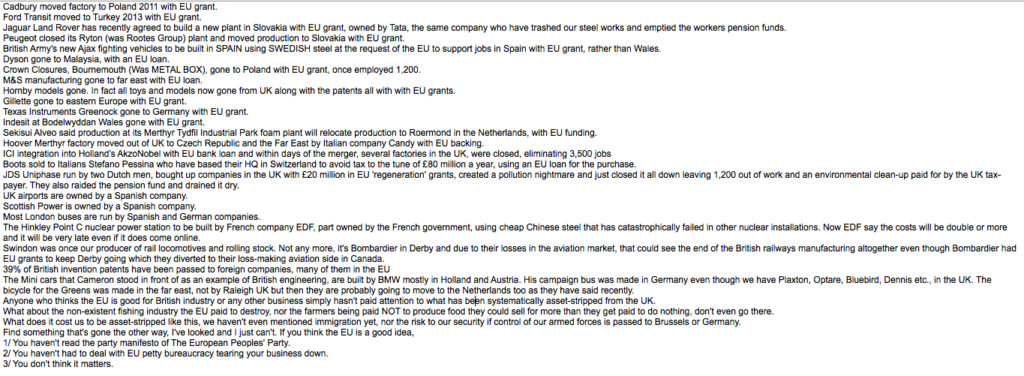
A series of claims ironically entitled “how good the EU has been for British jobs” has popped up on numerous comment boards and social networking sites, purporting to show that the EU has repeatedly paid companies to leave the UK.
The statements, made by various sources in similar terms along these lines, are not true, according to three companies on the online list contacted by InFacts. Dyson, Jaguar Land Rover (JLR) and Marks & Spencer all denied they had received EU funding in the way suggested.
This issue should be put in context of European Investment Bank lending in Britain, which was worth around £6 billion last year. EIB loans fund projects like Crossrail and the Midlands Metropolitan Hospital in Birmingham. Notably, the bank lent Ford £450 million in 2010 to develop a new generation of greener vehicles in the UK.
That is on top of the £13 billion in EU structural and investment funds that we are due to receive over the current 7-year budget period. In addition, we are the second-largest recipient of EU research funds, which benefit companies like Ford, Marks & Spencer and JLR.
In addition, rather than the EU shooing companies away from the UK, our membership of the single market wins us vast sums in investment, both from businesses headquartered on the continent and international firms that want to use the UK as a springboard to access the bloc. Brexit would destroy thousands of jobs that this investment creates.
The Institute for Fiscal Studies notes foreign direct investment to the UK is worth an average £54 billion per year. It reckons Brexit would reduce this sum by between 10% and 45%.
Sources. Infacts | ILoveTheEU.co.uk
We were only joining a free trade zone
One of the most frequently repeated lies about Europe is to say that, when we joined the EU, ‘we were told we were only joining a free-trade area’ and ‘no-one told us that it was more than that’. The history is clear, as shown below:
“Whatever the economic arguments, the House will realise that, as I have repeatedly made clear, the Government’s purpose derives above all from our recognition that Europe is now faced with the opportunity of a great move forward in political unity and that we can — and indeed must — play our full part in it.” – Prime Minister Harold Wilson, presenting the reasons for British membership of the EEC in 1967
And, in the run-up to the British referendum, the government’s own published documents spell this out even more clearly. The White Paper of 1971 spoke of “an ever closer union among European peoples”, an objective “to which this country can wholeheartedly subscribe”. It said that “what is proposed is a sharing and enlargement of individual national sovereignties in the general interest”; “Europe united would have the means […] which Europe divided has lost”.
Most tellingly, the government of the day spelled out clearly that “if the political implications of joining Europe are at present clearest in the economic field, it is because the Community is primarily concerned with economic policy. But it is inevitable that the scope should broaden as member countries’ interests become harmonised […] What is proposed is a sharing and an enlargement of individual national sovereignties in the general interest”. Source: Richard Corbett
We’ve lost control of our borders
No, we haven’t. The UK is not part of the Schengen Zone like most of mainland Europe. So we check everyone who comes through our borders. Freedom of movement of people means anyone from the EU can travel, live and work in the UK. However, they must be able to support themselves. Our government chose not to implement the ‘3 month rule’ whereby we can send home anyone who is either unemployed or can’t support themselves. The UK also chose not to implement the seven-year brake on migration from new EU member states in 2007, unlike many other EU member states.
Too many migrants draining the economy
Immigration is a complex issue, and won’t be ‘solved’ by a blunt instrument like Brexit. First off, it’s important to note that the UK is an ageing population and that numbers of younger tax payers are reducing relative to those older people who are taking out increasing amounts in pensions, social- and health-care. The interesting, and perhaps surprising, thing is that EU migration is a net benefit to the UK. In other words, they pay more in tax than they take out in benefits.
Part of the reason for this is that EU migrants are young, fit and economically active. Their education was paid in their home country, so they arrive in the UK ready to work and paying taxes. EU citizens pay over £1.18 in tax for every £1 claimed in benefits, opposed to UK nationals who pay 79p in tax for every £1 claimed. EU citizens make up 10% of registered doctors and 4% of registered nurses working in NHS, and many farm labourers and hospitality staff are EU nationals. It is true to say that if you’re in hospital you’re more likely to be treated by an EU migrant than have one in the bed next to you.
Since the 2016 referendum, numbers of EU immigrants have fallen, with the consequence that already understaffed hospitals and care homes are losing key doctors and nurses and finding it impossible to fill the gaps. EU migration is the lowest it’s been for some time. But, and some Brexiters might find surprising (and alarming), migration from outside the EU is higher than it has been for for 15 years.
The government’s recent Migration Advisory Committee found that there is no impact on wages with workers who are on average pay. There was a very small impact with those on the lowest wages, but this amounts to pennies rather than pounds.
Unelected bureaucrats
The EU is every bit as democratic as the UK, and in some ways more so, but it’s important to see what the differences are. Firstly, it is key to note the EU is not a party-political organisation as we have in the UK. The EU doesn’t vote in one administration, and then vote in another in 5 years time. It doesn’t elect MEPs on a ‘manifesto’ as such, it votes on them to represent our interests and to create and scrutinise laws that affect the EU as a whole. Unlike elections in the UK, elections for MEPs are done on a proportional representation basis. Our UK parliament manages the key things in the UK like defence, taxation, spending, etc. Because most EU laws must be ratified by all member states, it is impossible for any one country’s interests to override the interests of all.
So, how does it work?
European Council
This is the supreme political authority, giving impetus and direction to policy-making. The European Council is made up of heads of state and government, all directly democratically elected by their own people (only democracies can join the EU). The European Council also elects the President of the European Commission.
Council of the European Union (Council of the EU)
The Council of the European Union comprises ministers from member states, different ones according to policy area (e.g. agriculture, environment, transport, etc.). Decisions are made by qualified majority or, in the case of tax, defence and foreign policy, unanimously (Ie. all must agree).
European Parliament
MEPs in the European Parliament are directly elected by their member states under a system of proportional representation. They scrutinise laws drafted by the Commission (in a similar committee system used by the House of Commons) as directed by the Council of the EU and then vote to approve or reject them.
European Commission
The Commission is the equivalent of the UK’s civil service. Members of the Commission – the Executive body – are nominated by the governments of the member states and selected by the president of the Commission. The composition of the Commission has to be approved by the European Parliament, which also has the power to dismiss it. The role of the Commission is to draft, enforce and monitor the laws, but not to pass them – that is the job of elected MEPs.
For the vast majority of laws, consent from both the Council of the EU and the European Parliament is required before a law may be adopted. National parliaments also have a role. If one third of national parliaments oppose a draft law, this would force a vote in the European Parliament or the Council of the EU.
In brief: laws are made by the EU’s directly elected governments and more often than not the European Parliament through the co-decision procedure. The EU isn’t perfect and suffers in particular from low voter turnout but according to the Electoral Reform society, that democratic deficit can be tackled.
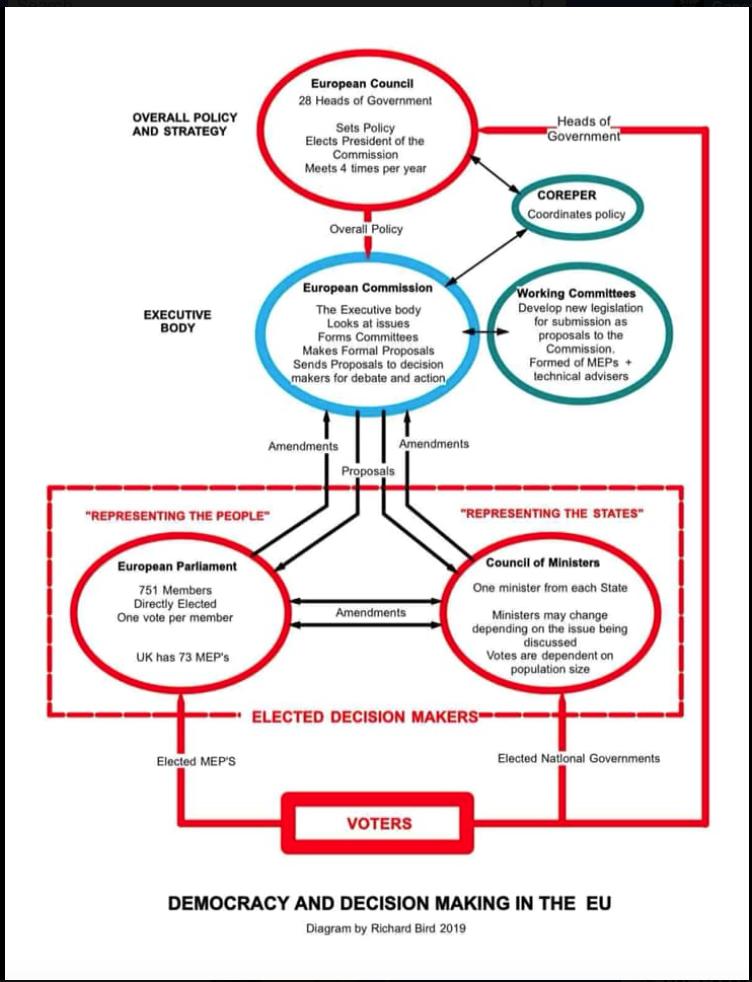
Click here to watch an interview between German news channel DorfTV and Dorset for Europe campaigners Muriel Goudet and Geneviève Talon, in which several Brexit realities were confronted. The interview was recorded while they were in Strasbourg in April 2019.
The European Parliament Ambassador School Programme
The European Parliament Ambassador School Programme is an EU-wide project available in the UK since 2021. The programme teaches secondary students about the role of the European Parliament and the history of the EU through educational materials and student-led engagement initiatives. The overall aim is to unite young people across Europe and raise awareness of European parliamentary democracy and European citizenship values.
Schools and colleges that complete the programme are awarded European Parliament Ambassador School (EPAS) status and join a network of over 1,500 EPAS schools across the EU.
Dorset for Europe believes that the EPAS Programme is a powerful educational tool to enlighten young people about the value of the EU institutions and what the UK has to gain from a closer relationship with our European neighbours. We would encourage schools to check out the introductory video below and to sign up to the scheme.
Further Information on the EPAS Programme is available from EPAS and the European Parliament Liaison Office in the UK.
If you are interested, please also contact Dorset for Europe.
Groups of Interest
Maintaining links to the EU
‘We are a grassroots organisation, with a community of tens of thousands of activists and 126 local groups across every nation and region of the UK.
‘We are an independent all-party pressure group campaigning for a close relationship with the European Union, and to ensure that European values, standards and rights are upheld in British law post-Brexit.’
‘The Young European Movement UK is Britain’s leading pro-European youth organisation, open to all those aged under 35.
‘We are committed to promoting European values and culture across the UK and ensuring that we stay closely linked to the rest of Europe.’
‘Following the withdrawal of the United Kingdom, four members of the European Parliament – Katarina Barley, Nathalie Loiseau, Terry Reintke and Radosław Sikorski – have decided to establish the UK Friendship Group. Non-partisan, hence open to all MEPs and former British MEPs, the UK Friendship Group is dedicated to maintaining strong links between citizens both from the EU and the UK.
‘Through regular exchange and various events, the UK Friendship Group aims at giving a space for debate to citizens, experts, civil society and politicians on subjects that matter both to EU and UK citizens regarding their rights, their future and the future relationship.’
‘Since its formation in 2018, the purpose of grassroots for Europe has been to coordinate, strengthen and provide a voice for grassroots pro-remain / pro-EU campaigns in the UK and for UK citizens in the EU.
‘We will continue to focus on the needs and capabilities of grassroots pro-EU groups, seeking to ensure their fullest joint contribution in a wider collaborative campaign setting, now additionally served by a national team of elected officers, organised democratically and adequately resourced to fulfil our role.
‘Grassroots for Europe is committed to providing a body and a voice for those working through local campaign groups towards restoring the UK’s rightful place in the European family of nations. We will fulfil this goal by:
- campaigning for the UK to have the closest possible relationship with the European Union, including, as soon as possible, by re-joining the European Union;
- actively engaging with the EU–UK Friendship Group of the European Parliament as well as official agencies and other cooperation channels;
- identifying, exposing and publicising the adverse consequences of Brexit as they arise, particularly highlighting the effects of new trade agreements (or of their absence) and their impacts on UK communities and businesses;
- resisting and reversing the damaging effects which pro-Brexit campaigns and policies have already inflicted on our democracy and on social cohesion, securities, rights and freedoms;
- championing our European identity and the values of the European Union, including the promotion of peace, prosperity, equality, solidarity, democracy, human rights, the environment and the rule of law;
- promoting and giving practical demonstration of European solidarity and shared values, by encouraging grassroots pan-European dialogue, friendship and collaboration at the level of civil society, economies, science and culture;
- defending the rights of European Union citizens in the UK and UK citizens living in the European Union; and
- promoting a greater understanding of the UK’s historic, present and future interdependence with the other countries of Europe.
‘Grassroots for Europe is a network of over 250 local pro-EU campaign groups. Our aim is to support the activities of all groups, regardless of affiliation, by sharing knowledge and expertise, facilitating links between groups and their members, and backing innovative grassroots campaign initiatives.’
Set up in 2017 as a reactive campaign against Brexit, Best for Britain was relaunched in April 2021 with a widened remit to promote internationalist values and working with the world on cross-border issues such as peace, security, research, climate solutions, cures, vaccines and trade.
Best for Britain believes that ‘global Britain’ should set an example by upholding its international treaty obligations and overseas aid commitments. It advocates against isolationism and for closer cooperation with the European Union and the rest of the world in areas that benefit us all.
Principal campaign priorities include: electoral reform and democratic equality; restoring public trust in politics through decentralised political decision-making to put power into the hands of local communities; new economic models to reduce wealth inequality; using technology to help solve global crises and boost educational attainment and health outcomes; protecting the rights of minorities and asylum seekers; and combatting the current culture wars that seek to divide society, in favour of building national consensus that paves the way for a modern, forward-thinking, outward-looking government.
An initiative operated by UKPEN Ltd to establish a national database of pro-EU supporters, in line with data protection legislation, which can be accessed by pro-EU organisations in their future campaign work. By signing the register you agree to your data being shared with UKPEN-linked national and regional pro-EU organisations, a list of which is accessible on the website.
‘New Europeans is an award-winning civil rights movement working for a Europe of citizens – a democratic Europe of equality and social justice, anchored in human rights.
‘We work in Europe and internationally from our base at the Brussels Press Club. We are active in the EU, as well as in the United Kingdom, Belarus, the Ukraine and North America.
‘To take the European project to the next level we need to work on the foundations – rule of law, human rights, solidarity and democracy. This is the current focus of our work.’
Current projects and campaigns include:
- asylum and migration;
- continuing to fight for the rights of EU citizens in the UK and UK citizens in the EU through the #EUGreenCard and #DeniedMyVote campaigns;
- the rule of law in Poland;
- media freedom in Hungary; and
- the European Health Union.
Online discussions and webinars are held regularly on various topics:
- Europe Future Fringe – ‘Join the conversation about the future of Europe through our collaboration with Europe Future Forum, VolontEurope, VoxEurop and others, energising the debate on the future of Europe.’
- The Tuesday Conversation – ‘Take part in conversations between Europeans that inform, inspire and entertain, moderated by communications expert Povl Henningsen.’
- The Friday Casebook – ‘Looking at individual civil rights cases and how Europe can help.’
- Reflections on the Future of Europe – ‘A series of online presentations and expert discussions on issues to do with citizenship, democracy and identity in Europe.’
Also, a fab online shop for pro-EU merchandise, including clothing: i-heart-eu.myshopify.com
‘Stay European is a UK-based grassroots campaign for individual EU citizenship. It is an independent campaign, not set up by any pre-existing pro-European group, but hoping to work collaboratively with all. Stay European was established in January 2020 and has gathered over 100,000 supporters so far. Our campaign is run by volunteers and has no staff members.’
‘The campaign to re-join the European Union. Our aim is to take the UK back to its rightful place at the very heart of the European Union.
‘This campaign is not about disrespecting democracy – it is about promoting it. We believe the referendum itself was undemocratic, a fact evidenced by numerous ongoing legal disputes regarding over-spending and outright lying by the Leave campaign. Leave was a campaign based largely on lies, deceit and hate. Ours is a campaign with much more potent founding pillars: love, respect and truth.’
‘Another Europe is Possible was formed in February 2016 to campaign for a Remain position in the EU referendum from a specifically left, progressive perspective. We came together from across the spectrum of the progressive left, working across party-political lines to campaign for democracy, human rights and social justice.
‘Brexit is a national disaster for Britain, but it is not a ‘British problem’. All over Europe faith in the project of unity has eroded. Free-market thinking has dominated EU institutions for too long. Many people no longer have faith in the capacity of European democracies to deliver social justice by working together for the common good.
‘To rebuild this hope, the EU requires radical and far-reaching reform, breaking with austerity economics and pioneering a radically new development strategy. That’s why we are actively working together with international partners, such as European Alternatives, to campaign for political change across the continent.’
Alternative media / non-UK-based news sources
‘Byline Times is run by a small, dedicated team of journalists providing a platform for freelance reporters and writers to produce fearless journalism not found in the mainstream media.’
‘We are an international news media, providing news with a European perspective to a worldwide audience through 12 cross-platform editions, of which 9 with distinct TV channels.
‘Our mission is to empower people to form their own opinion. We trust in people’s intelligence and ability to make up their own mind and seek to provide our audience with the greatest diversity of viewpoints through journalism that is unapologetically impartial.
‘We don’t trade in bias and outrage; we focus on facts, ideas, and solutions.’
‘Europe Street News is an online magazine covering citizens’ rights in Europe. Launched in August 2016 to inform EU nationals in the UK and British residents in the rest of the EU about their changing status in the context of Brexit, Europe Street News covers, through a website and a newsletter, everything related to EU rights and freedom of movement in the European Union. It is a unique source of information for anyone interested in a European perspective on the changing relationship between the UK and the European Union.’
‘West Country Voices is a regional online newspaper that supports citizen journalism. Our aim is to publish well-written, fact-based articles and opinion pieces on subjects that are of interest to people in Cornwall, Devon, Dorset and Somerset. In so doing, we seek to demonstrate democracy in action by giving a voice to local people and holding our elected representatives to account.’
Changing the political system
National movement for proportional representation.
‘We campaign for your democratic rights and a democracy fit for the 21st century. We work across the political divide with all the parties and civil society to put voters at the heart of British politics.’
‘We’re building a movement of people from all corners of the UK who will demand a democratic society that centres equality and justice for all. We demand that the values we collectively share are enshrined in a new constitution that is built and owned by all of us. The new constitution will set out what rights and freedoms should be protected, and what the government can and can’t do in our name.’
Holding politicians to account
‘The Good Law Project is a not-for-profit membership organisation that uses the law to protect the interests of the public. We fight cases that defend, define or change the law and we use litigation to engage and educate. We challenge abuses of power, exploitation, inequality and injustice. We are a bold, young organisation with a ground-breaking track record. We speak the truth and act with integrity.’
Political party-specific
Labour Campaign for Electoral Reform
‘LCER is a network of Labour members and supporters campaigning for the Labour Party to back the introduction of a more proportional voting system. We believe the current voting system (First Past the Post) is unfair, outdated and not fit for purpose. We want to see FPTP replaced with a voting system in which everyone’s vote counts, seats are allocated broadly in proportion to the votes cast, and the link is maintained between MPs and their constituents.’
‘As pro-Labour, pro-European activists, we now need to be realistic and pragmatic when we look at the road ahead. But we don’t need to forget what we believe in and what we want to fight for. In the short to medium term, we need to fight to keep Britain as close to Europe as possible. In the longer term, we can focus on bigger goals.’
Volt UK is the UK branch of Volt Europa (volteuropa.org), a pan-European political movement, which has branches and affiliated political parties across the EU, including an elected MEP from Germany.
‘Founded in 2017 by three Europeans from France, Germany and Italy in the light of the Brexit referendum and the rise of populist movements, Volt was born as a pan-European movement and party aimed to push for a more progressive, pragmatic, evidence-based policy approach to transnational issuessuch as populism, discrimination, social and economic inequality, corruption and climate change.
‘Volt is the first successful pan-European political movement, focused on empowering citizens in politics for a Europe based on a strong political union between the European nations, where risks are shared and benefits reach everyone, not just a few. Through a grassroots approach to politics, and community-organising initiatives, we are connecting and enabling communities, at local and national level, to become empowered and fight for a better future.’
Keep in touch!
Please use the form to sign up for our newsletter and campaign communications and to find out more about Dorset for Europe
